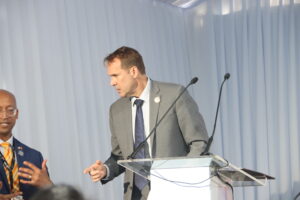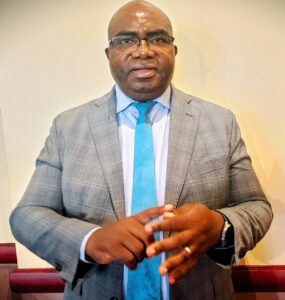On the sidelines of the 17th US Africa Business Summit in Luanda, Angola, Africa News 24 Managing Editor, Silence Charumbira, interviewed Salome Makau, the Country Head of Visa Southern Africa about the transformation of the financial technology and banking space. She said Visa was committed to expanding the reach and impact of digital payment systems to support businesses who are turning to technology to strengthen their operations. Below is the interview:
AN24: The fintech space has changed immensely over the last few years. It keeps evolving. What are you doing to keep pace?
Salome Makau: Visa partners closely with a diverse range of fintech companies to drive the widespread adoption of digital payments. As businesses across the continent increasingly turn to technology to strengthen their operations, our goal is to expand the reach and impact of digital payment systems.
While cash will likely remain a part of the financial landscape, digital alternatives offer clear advantages—such as enhanced security and simplified cross-border transactions.
To meet the evolving demands of the African market, Visa is actively working alongside fintechs, neobanks, and digital wallet providers to design and deliver forward-thinking payment solutions tailored to local needs.
- One example is Visa’s partnership with Moniepoint (Nigerian-based). This partnership is set to leverage Moniepoint’s impressive acceptance footprint and rails for digital payments.
- At the time of investment, the platform was processing over 1 billion transactions monthly, with total payment volume exceeding $22 billion, enabling businesses to digitise their operations and thrive in Africa. On top of the acceptance infrastructure, they are building a true end to end SMB enablement platform by adding services that will enable SMBs to grow such as credit enablement, business management software, FX services, etc. This company exhibits significant growth and product market fit, naturally achieving unicorn status. Its focus on SMEs, which are the lifeblood of most African markets in terms of employment, trade, and GDP, underscores its scale and impact on the continent.
As part of Visa’s work to unlock financial innovation across the continent, our Fintech Accelerator biannual program offers 12 weeks of 1:1 mentorship and personalised training, providing seed to series A startups with exclusive opportunities to access funding, development, and resources.
Cohort 2 startups from last year operate across 28 African countries, a 55% increase from Cohort 1 where the representatives operated across 18 countries. 65% of them feature female leadership, rising from 43% in the inaugural edition.
We recognise the evolution of fintech start-ups and have a particular focus on elevating women entrepreneurs. As an example in South Africa, through our partnerships with AfriLabs and the Graça Machel Trust, we launched the RevUp Women Initiative in 2023, providing capacity-building training and mentorship to 500 early-stage, women-led start-ups across Africa and awarding $10,000 to selected entrepreneurs of the program – providing them with the tools and guidance needed to elevate and develop their businesses.
AN24: Security of financial services users’ data which leads to access to their money has emerged to be one of the biggest concerns in recent years. What with hackings as well as simple protection of personal data. How are you adapting to these challenges to safeguard Visa clients?
Salome Makau: Visa is highly proactive when it comes to spreading the word to be safe online. The latest Stay Secure study commissioned by Visa surveyed over 5,800 consumers across Central and Eastern Europe, the Middle East, and Africa (CEMEA). It found that trust and security remain the biggest barriers to digital payment adoption, with consumer education emerging as the most powerful tool to bridge the gap.
Tokenisation, for example, is a security technology that helps protect your payment information. When you make a digital payment—like tapping your phone or paying online—your actual card number is not shared. Instead, it’s replaced with a “token”, which is a random, unique code that’s used just for that transaction. So even if someone intercepted the payment, they wouldn’t get your real card details—just a useless string of numbers. It’s like using a fake name for safety, but the system still knows it’s you behind the scenes.
Cash can be lost or stolen and used by anyone. Digital payments are protected by PINs, biometrics (like fingerprint or facial recognition), and encryption; so really, digital payments can be a lot safer than cash transactions. Every digital payment creates a record, which helps detect fraud or resolve disputes. With cash, once it’s gone, it’s gone.
AN24: A huge chunk of Africans remain unbanked. What is your contribution towards improving the situation? What are the impediments?
Salome Makau: At Visa, we believe in uplifting innovation while driving access and inclusion across the financial ecosystem. As Africa’s digital economy is expected to contribute >$300bn to the continent’s GDP, Africa has the potential to be a technology powerhouse, provided financial inclusion is prioritised across the board.
Africa has the youngest, fastest growing population in the world (estimated to reach 2.5 billion people by 2050), who are digital-first and increasingly connected. In 2017, 60% of the 1.2 billion people living in Africa fell below the age of 25. We know that young people are the future, and we need to remove the obstacles that are preventing them from operating in the financial sphere.
As e-Commerce payment volume in Africa continues to grow, with contactless payments being virtually non-existent to now constituting just over half of all transactions on the continent, the best way to ensure more people have access is to collaborate.
At Visa, we view collaboration as the cornerstone of meaningful progress. By working together, we unlock shared potential to tackle challenges and embrace new opportunities. This belief has shaped our success both across Africa and around the world, fuelling strong partnerships and impactful innovations.
Through collaborating with top banks and financial institutions, we’ve pioneered cutting-edge mobile payment solutions that are expanding access to financial services for millions across the continent. These joint efforts have enabled the launch of groundbreaking offerings—from digital wallets to micro-lending platforms—that address real financial needs.
By engaging with partners across diverse sectors, we’ve been able to deliver long-term support for small and medium enterprises (SMEs), driving economic inclusion and fostering a vibrant entrepreneurial ecosystem.
It’s worth noting that Visa is also doing work to improve the daily, digital lives of citizens across Africa.
- A best practice example of public/private collaboration in practice is the recent announcement made in April, regarding the signature of a MoU with the minister of economy of Gabon. Minister Mark-Alexandre DOUMBA signed an MOU with Visa and the Ministry of Economy & Participations of Gabon, for the development of a Government Digital Payment Infrastructure. The MOU encompasses the launch of a Digital Taxpayer Card, a Digital Government OPEX Management Card and the launch of eID with Citizen Wallet.
AN24: Technology is moving fast. In some instances, even faster than its users. A lot of us have gadgets that could be termed obsolete when it comes to some of the newest fintech facilities and services. How is Visa helping clients catch-up?
Salome Makau: Visa remains committed to delivering payment solutions that align with the latest technological advancements, encouraging partners—from merchants to banks—to adopt modern digital payment methods. We understand that some consumers may still use older mobile devices. In such cases, traditional bank cards, supported by Visa’s secure infrastructure, remain a reliable and widely accepted option.
At the same time, we continue to promote the use of smartphones for payments—across a variety of models and price points—given the added benefits of convenience, enhanced security, and speed. Whether through card or mobile, Visa ensures that users at every level of digital readiness can access safe, seamless payment experiences.
More from Africa News 24
Guiding light – The challenge lies in ensuring that the Bandung legacy is upheld in today’s world
AN24: What are some of the biggest challenges that Visa is facing and how are you overcoming them?
The adoption of AI-technology is very exciting in the digital payments landscape, but Africa is still lagging continents like North America when it comes to utilising the current technology and advancements to come. Agentic AI is very much at the heart of the next wave of payments, whereby AI will assist with seamless purchases based simply on an instruction. These shifts in how we navigate the retail market will bring about an evolution in how we shop.
One of the persistent challenges across the continent lies in the regulatory and policy landscape. Sustainable and inclusive growth in Africa hinges on the presence of enabling policies and frameworks—those that foster innovation, attract investment, and support broad-based digital adoption in a competitive environment.
We believe digital government systems can serve as powerful tools to enhance transparency and operational efficiency, strengthening the connection between citizens and public institutions, and creating fertile ground for entrepreneurship and inclusive economic development.
While financial inclusion across the continent also remains a challenge, we’re committed to highlighting financial education, cybersecurity and the vast potential of digital payments. By working together with the local private and public sector, fintech startups, and businesses, we can create tailored products and services that reach those who are currently excluded from the financial system. Through an aligned vision and robust collaboration, we can lay the groundwork for a thriving digital economy across the continent.












